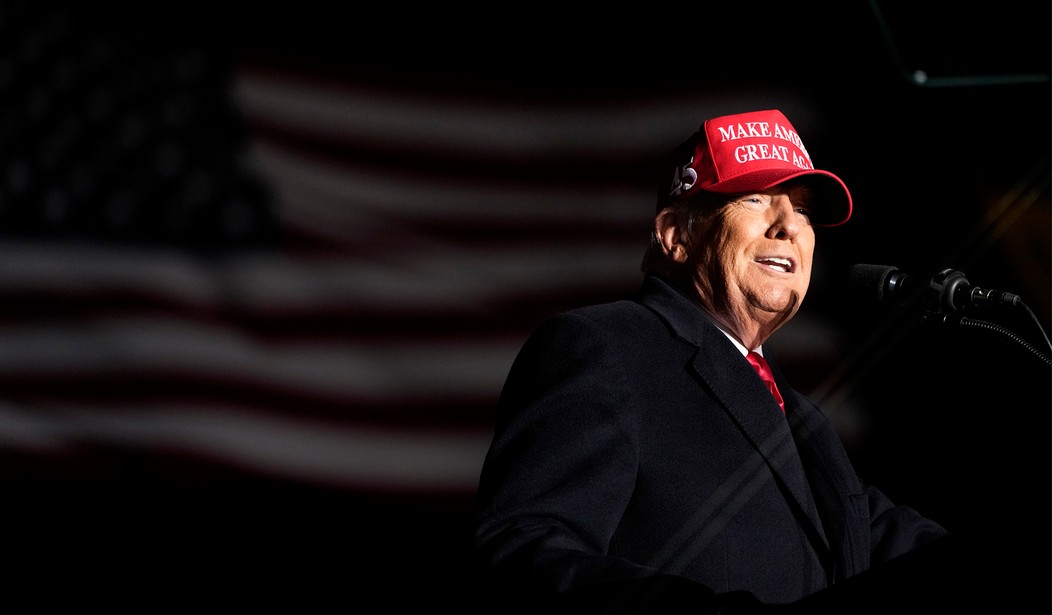When John Quincy Adams was informed by a committee that he was elected president by the House of Representatives, for the first and only time through the procedure set by the 12th Amendment of the Constitution, he responded in writing. "The answer was not very gracious," writes historian George Dangerfield. "If it were possible, wrote Mr. Adams, by declining the office to cause an immediate election that would bring about a clearer result, he would gladly do so. But since this was not Constitutionally permissible, he accepted the Presidency."
The 45th president evidently takes a different view than the sixth president of what is politically appropriate and constitutionally permissible. Last weekend, on his proprietary Truth Social website, Donald Trump wrote, "So, with the revelation of MASSIVE & WIDESPREAD FRAUD & DECEPTION in working closely with Big Tech Companies, the DNC, & the Democrat Party, do you throw the Presidential Election Results of 2020 OUT and declare the RIGHTFUL WINNER, or do you have a NEW ELECTION? A Massive Fraud of this type and magnitude allows for the termination of all rules, regulations, and articles, even those found in the Constitution."
The former president did not specify who is entitled, and by what writ, to declare the rightful winner, mandate a new election or terminate the rules, regulations and articles in the Constitution. By any fair reading, his words seem at odds with the presidential oath to "preserve, protect and defend the Constitution of the United States."
This is not to say that he doesn't have some valid complaints. His post was apparently in response to the revelations authorized by Twitter's new owner Elon Musk and circulated by independent journalist Matt Taibbi about Twitter's largely successful suppression of the New York Post's October 2020 stories dealing with the material on Hunter Biden's laptop.
Recommended
The Twitter report also makes it plain the FBI officials advanced without basis the theory that the Biden laptop had been hacked, which former FBI general counsel James Baker as Twitter general counsel used to justify Twitter's suppression. This week, Musk fired Baker for limiting Taibbi's disclosures.
Twitter didn't act alone back in October 2020. Some 50 former intelligence officials issued a statement saying the Biden emails had "all the classic earmarks of a Russian information operation." That statement was itself disinformation, it turns out. And it should not need to be said that law enforcement and intelligence agencies and officials should not interfere in political elections.
This was not the first such interference, of course. FBI officials, including former Director James Comey, were complicit in the Russia collusion hoax, promoting the fraudulent Steele Dossier originally prepared for Hillary Clinton's campaign.
It would be interesting to imagine a counterfactual history in which incoming President Donald Trump was not distracted by baseless charges of collusion advanced by high government officials and leading Democratic officeholders and given unearned credibility by a partisan press determined to bring down a hated president.
Perhaps, in that alternate world, partisan feelings would not be so bitter and confidence in institutions so low as they are today. And as they continue to be, Trump's refusals to apologize for misstatements and to admit that he lost the 2020 election resemble many vaunted media organizations' refusals to apologize for hyping the Russia collusion hoax and for suppressing legitimate news helpful to the Trump campaign.
In summary, plenty of disgraceful misconduct all around. And self-defeating misconduct at that.
It's hard to see how Trump's statement about "terminating" the "rules, regulations, and articles" in the Constitution doesn't disqualify him for the second term he says he seeks. Polls have shown his support leaking away, and Trump-endorsed Senate candidates went down to defeat this November in Arizona, Nevada, Pennsylvania and this week in Georgia. It's become clear that whining about losing the last election is not a vote-winner.
It's also true that theoretically apolitical law enforcement and intelligence agencies, as well as the political press, have forfeited the trust of an uncomfortably large number of citizens. There's a price to pay for their disregard of high-minded exhortations that election results, however unwelcome, should be respected and officeholders treated as legitimate.
More confessions of error, such as Silicon Valley Rep. Ro Khanna's opinion article in the Wall Street Journal, are in order. But few others have been forthcoming.
How this downward spiral ends is not clear. John Quincy Adams, reluctant to accept the office, lost the next election to Andrew Jackson, then was elected to the House and served with distinction for the rest of his life. Maybe Trump could astonish everyone by accepting his retirement and sitting down at a desk in Mar-a-Lago and writing a book describing his not nonexistent accomplishments. Any chance?

























Join the conversation as a VIP Member